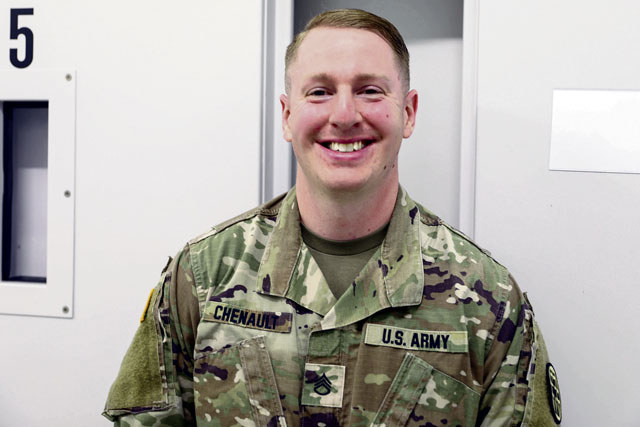
U.S. Army Staff Sgt. Tyler Chenault, facility operations NCO, U.S. Army Regional Correctional Activity-Europe, is experienced in his field, serving at four facilities in eight years.
Chenault is a native of Kenai, AL., and moved to Spokane, WA., at 16 where he enlisted in 2014 as a corrections and detentions specialist. His current assignment is at U.S. Army Regional Correctional Facility-Europe on Sembach Kaserne in Germany.
“It’s been a great honor to work at this facility,” said Chenault. He praises the work of his teammates and appreciates working alongside Navy and Air Force liaisons.
USARCF-E is his first level one facility and comes with a different mission than he is used to. Other facilities he worked at such as Northwest Regional Correctional Facility in Washington and Midwest Regional Correctional Facility in Kansas focus more on sustainability, whereas USARCF-E hold prisoners for less than one year.
“It’s a whole different mission and ball game when it comes to care, custody, and control for the prisoners in here,” said Chenault.
Chenault’s role works closely with the chief facility operations officer, to keep team components working cohesively to ensure the prisoners are taken care of. Chenault says his job is easy but comes with its challenges, especially psychologically.
“You can’t freely leave the prison,” said Chenault. “You can’t have your electronics. It’s kind of like you’re living in the prison while you’re working.”
Chenault does enjoy his work hours inside the facility by getting to know his coworkers. Without all the distractions, he and his coworkers are left with more than enough face-to-face time. Chenault says working in a corrections facility develops his skills and respect for others because he is learning their backgrounds and different opinions.
“No matter who it is and what they have done, they are still humans,” said Chenault.
Becoming a drill sergeant or advance individual training instructor is Chenault’s next goal. He plans to retire from the Army to pursue teaching or counseling to help others.


